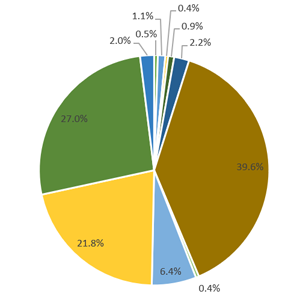Walden Completes Renewable Energy Production and Storage Review and Feasibility Study at Water Treatment Plant
Introduction
Walden recently completed a Renewable Energy Production and Storage Review and Feasibility Study (Study) at a Water Treatment Plant for a community in New York. The purpose of this Study was to provide a resource for the community to better understand the feasibility of utilizing renewable energy technology at their Water Treatment Plant (WTP).
The community is considering installing solar energy production and battery energy storage systems at the WTP in hopes of saving money for the ratepayers of the utility and members of the community. In addition, this could provide a prime example of successful use of renewable energy for industrial application, enlightening other communities and encouraging them to seek renewable energy technology.
The community is also seeking to advance to the next level of New York State’s Climate Smart Communities (CSC). Specifically, this Study fulfilled PE4 Action: Renewable Energy Feasibility Studies requirements.
Existing Electrical Charges Profile
Existing municipal billing records for the community were obtained and analyzed to determine the amount of electricity used by the WTP. Chart 1 shows a breakdown of a typical month of the electric company bills for all municipal accounts. The chart represents billing information from April 2020 (Test Month). The legend was removed to preserve client confidentiality, but the yellow (21.8%) and green (27.0%) segments of the chart are associated with the WTP. Chart 1 demonstrates that a large percentage (49%) of the monthly electric bill cost is due to providing safe drinking water.
Chart 2 shows a breakdown of the main grouping charges on the electric company’s bill for the WTP for the Test Month. This chart demonstrates that a large percentage (37%) of the bill is for the “Demand Charge,” which is the component that would be reduced with energy storage through “Peak Shaving.” Peak shaving is achieved with energy storage by replacing grid-provided power during the times that electricity demand is the highest.

Read more about some of Walden’s other research and development projects here, and contact us at 516-701-1681.
Chart 1. Distribution of Charges on the Community’s Municipal Electric Bill

Chart 2. Breakdown of Charges on the Electric Company’s Bill for the WTP

Walden’s Results and Findings
Walden determined that the WTP uses more than 250,000 kWh annually. Supplying water to the community accounts for almost half (49%) of the municipality’s total electric expenses, and a large portion of that is demand charges. Thus, solar or energy storage, and especially a combination of the two have a huge potential to reduce the overall cost of the community’s municipal electric bill.
The pumps at the WTP that supply water to the membrane filters were found to be the main source of electric consumption at the site. These pumps are therefore the prime location for energy storage and would greatly reduce the community’s municipal electric bill through peak shaving. Energy storage at these types of WTPs is expected to become even more feasible in the future as the cost of batteries decreases.
After comparing three solar location options at the WTP, Walden concluded that all three options could be effective in reducing the cost of electricity at the WTP. The roof option would be the least costly, but would only produce approximately 27% of the annual amount of electricity consumed at the WTP. While the ground and reservoir options would cost much more than the roof option, they would be capable of producing 100% of the annual amount of electricity consumed at the WTP. For all three options, the project cost could be reduced for the community by grants, outside investment, or other financial assistance that is available to support renewable energy production.
If you are interested in the feasibility of renewable energy production and storage at your municipal or industrial site, please contact Walden by calling 516-701-1681. Click here to read about some of the other areas where Walden is focusing its research and development efforts.
